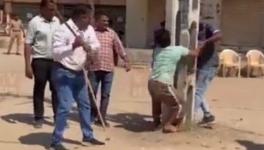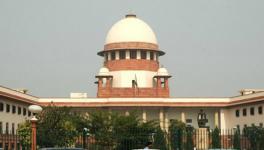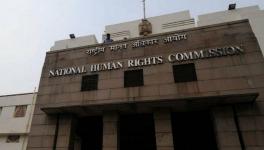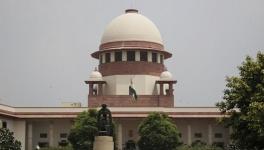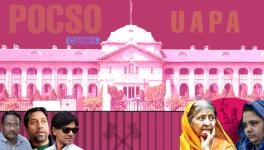Guj HC Orders Release of Suspected Foreigner Detained Without Being Heard
The Gujarat High Court has ordered release of a person detained by Gujarat’s Special Operation Group, on suspicion of being a Bangladeshi national, as principles of natural justice were not followed upon his detention. The Division Bench of Justices Sonia Gokani and Nirzar S Desai noted that the detaining authority has unbridled powers and a report was prepared against the detainee without awarding him any opportunity of being heard. He has been kept under detention since June 2020.
Background
The petitioner’s son was allegedly illegally detained by the Special Operation Group (SOG). She submitted that she has been living in Ahmedabad for a long time and has an Election Card, Ration Card as also Aadhaar Card. But when the corpus (her son) was born, registration of his birth was unknown to her, as she was unlettered. She stated that she was even rehabilitated with her family in the aftermath of the Gujarat riots of 2002 and received a plot and Rs. 50,000/- from the Ahmedabad Municipal Corporation in the name of her husband Sidiq Doudbhai Shaikh.
In June 2020, her son was detained by SOG on the suspicion that he is an illegal migrant from Bangladesh and was taken to a detention center. She made several visits to the police station as well as the detention centre, but her son was not released, hence she moved court.
She submitted that her son “is illegally detained in absence of any FIR or any formal complaint and without any sincere efforts to identify the genuineness of his citizenship. This conduct has become a trend and the only victims of this atrocious conduct are the poor citizens of India staying in slums and who are marginalized and voiceless.”
She further submitted, “What is fundamentally flawed in the whole attempt to detain and question the citizenship of the detenue is the fact that when his parents’ citizenship is not questioned and they are deemed to be citizens of India then, how could their child’s citizenship be put to scrutiny and that too, in the complete violation of due process.”
She put forth her complete family history right from her grandparents to her husband’s family lineage and how her husband had moved from West Bengal to Ahmedabad in search for work after which he married her in Ahmedabad itself. She also submitted that they are casual labourers and have a meagre source of income.
She further submitted that her son was born in 1984 and Section 3 of the Citizenship Act, 1955 provides that all those who are born on or after 26th Day of January, 1950 but before the 1st Day of July, 1987, shall be citizens by birth; further both his parents are citizens of India. Even in his School Leaving Certificate it is stated that he was born in West Bengal.
Plight of other detainees
Narrating the plight of other detainees, the petitioner submitted that “15 to 18 other detenue in the SOG premises are there, and one detenue named Zahid is lodged there for about more than 8 years. One Mr. Pannu is there for more than 4 years. A lady is also there for a long time who is separately kept in presence of women police. There is one detenue namely Saiful who was brought a day prior to the corpus and others and they are languishing there without any proper inquiry or trial in SOG Centre.” She added that there was no allegation of custodial violence of ill treatment against SOG by her son.
Respondent’s submissions
The SOG submitted that the corpus, Amir Sidikbhai Shaikh is the citizen of Bangladesh and is originally resident of Village: Diyadanga Post Kaile, Thana: Kaliya, District: Nodail (Bangladesh). He was detained and he never produced any documentary evidence to prove citizenship. He was detained under Section 3 (2)(g) of the Foreigners Act, 1946 and under Section 5 of the Foreigners Order, 1948 so also as per the notification of the State Government dated 02.12.1960. It was further submitted that except the copy of the Aadhaar Card, no other document had been produced and as per section 9 of The Aadhar Act, the Aadhar Card is not the document of citizenship.
Comments of Additional Solicitor General
The court had called upon Additional Solicitor General Devang Vyas to address the Court on the procedure of deportation of illegal nationals. He stated that there are two kinds of persons who can be called illegal:
- those who have already travelled on a travel document and such a document has expired and they continued to stay illegally, and,
- those who have entered illegally.
In the latter, the first step would be verification of nationality to begin the deportation process. The State Authority would contact the ministry of external affairs and would request nationality verification, the ministry would send to the High Commission of Bangladesh requesting them to verify the nationality, to issue a travel permit and upon verification of nationality, such travel permit is issued and deportation of the detainee happens. However, there is no time frame for this process.
The court noted the procedure to be followed under the Foreigners Act and noted that for the purpose of prohibiting, regulating or restricting the entry of foreigners into India the Central Government has the power to make provision either generally or with respect to all foreigners. Therefore, to say that by way of interim measures, the powers exercised are of only restriction, does not go with the scheme of the provision which does not provide for the restriction but speaks of the arrest, detention or confinement.
The court further noted that under section 8 when a foreigner is recognised as a national by law of more than one country or where it is uncertain what nationality is to be ascribed to him, he may be treated as the national of the country with which he appears to be most closely connected for the time being in interest or sympathy or of the country with which he was last so connected.
The court being conscious of precedents and also conscious of the fact that in the event of deciding the question of nationality, the issue shall have to be raised before the appropriate authority by the petitioner, restricted its inquiry into the validity and propriety of the order passed by the civil authority by examining the principles of administrative law. It said, “It shall have to be questioned as to whether the order passed was legal, rational and the procedural propriety also shall need to be inquired into. The principle of natural justice would demand the hearing as also considering the material which has been placed before the authority concerned.”
The court noted that the inquiry made by the detaining authority was limited to the visa and passport of the corpus at the time of detention and at this stage, before the court, many other documents were produced. “There has been no inquiry at all made of the parents of the present corpus as the mother is the petitioner and her nationality is not questioned nor doubted even,” the court pointed out. The court also noted that the corpus has no criminal background and has a wife of Indian nationality and has children as well. It observed, “The Central Government has delegated the powers to the civil authority which is from the State Government and the powers also are given to them to inquire into the nationality of a person, therefore, the powers are to be exercised in accordance with law. The least that is expected of the person who has been given such wide and vital powers of recommending the deportation of a person on the basis that he is not an Indian national, is to avail an opportunity of hearing to the person concerned.”
The court specifically noted that it had questioned the Prosecutor as to whether there is any notice given and a separate opportunity has been made available for those who have been suspected as foreign nationals, to adduce the relevant material for proving the nationality.
The Court did not cast any doubt on the identity of the corpus and noted that his entire family is in India, and said, “The report prepared by the DCP was without even availing opportunity to the corpus and the Additional Commissioner has acted upon the same. We are conveyed that till date, nothing has moved and the corpus continues to be at the detention centre. When serious flaw is noticed in observing principles of natural justice, without entering the issue of nationality, on a limited ground of non-availment of opportunity, this Court deems it appropriate to intervene and to that limited extent, indulgence would be inevitable, noticing unbridled powers assigned to the authority, of course, for catching illegal/unauthorized nationals. Resultantly, the opportunity requires to be availed noticing apparent breach of administrative law and very peculiar facts concerning respondent no.3 and his family.”
The court directed that the corpus be released within one week of this order on certain terms and conditions to ensure his availability if he cannot satisfy the authority on the strength of his testimonials.
The complete judgement may be read here:
Get the latest reports & analysis with people's perspective on Protests, movements & deep analytical videos, discussions of the current affairs in your Telegram app. Subscribe to NewsClick's Telegram channel & get Real-Time updates on stories, as they get published on our website.











